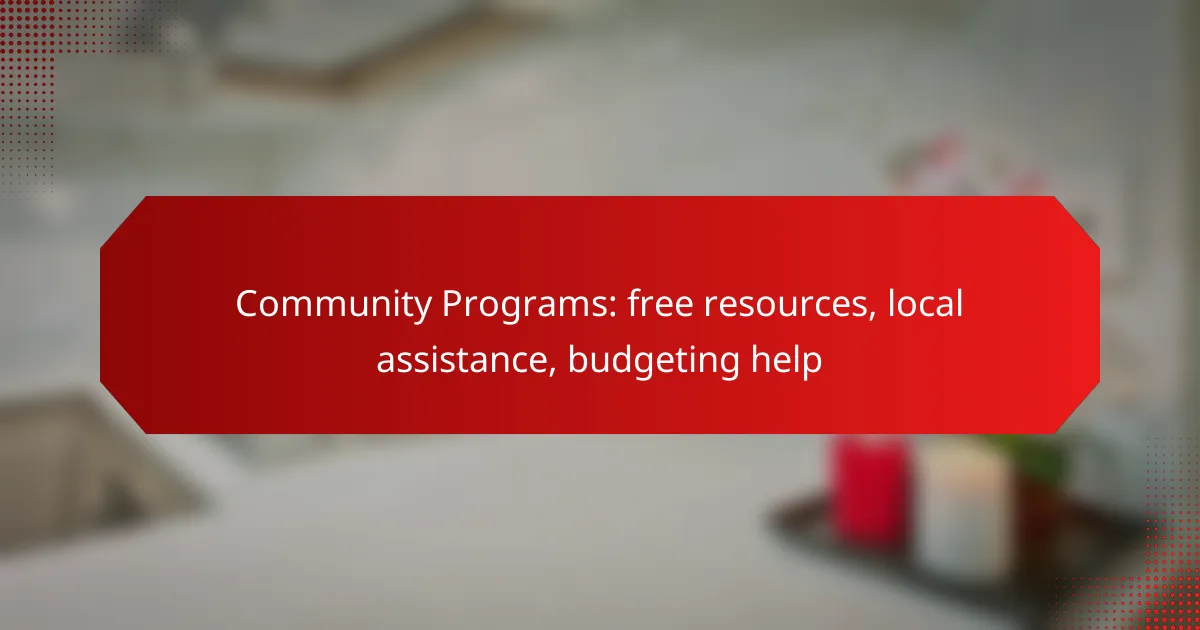Community programs in the UK offer vital resources such as food, housing, and healthcare to support individuals and families in need. By connecting with local assistance initiatives, you can access free resources, including budgeting help and job training, tailored to your specific circumstances. These programs aim to enhance financial literacy and stability, empowering you to manage your finances effectively and improve your overall quality of life.
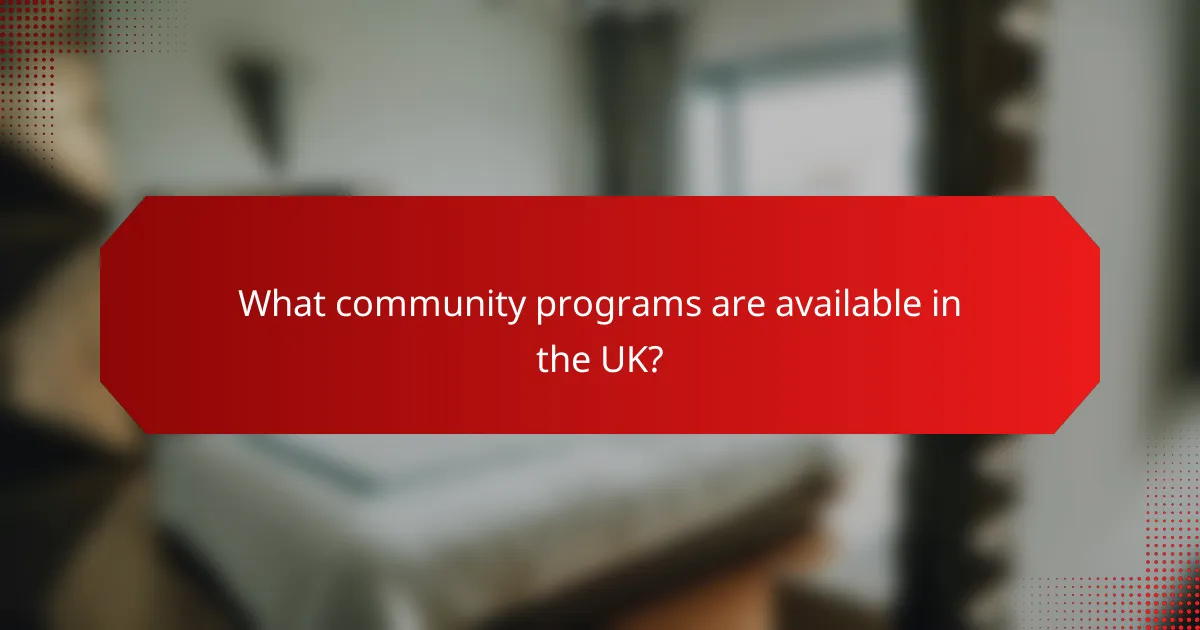
What community programs are available in the UK?
In the UK, various community programs provide essential resources such as food, housing, healthcare, job training, and educational support. These initiatives aim to assist individuals and families in need, helping them improve their circumstances and achieve greater stability.
Local food banks
Local food banks offer free food supplies to individuals and families facing food insecurity. They typically operate through charitable organizations and rely on donations from the community, supermarkets, and food producers.
To access a food bank, individuals usually need a referral from a social worker, doctor, or other support services. Many food banks provide additional resources, such as cooking classes and budgeting advice, to help clients manage their food needs more effectively.
Housing assistance programs
Housing assistance programs in the UK help individuals and families secure stable accommodation. These programs may include financial support for rent, assistance with finding affordable housing, or temporary accommodation for those facing homelessness.
Eligibility for housing assistance often depends on income, family size, and local council regulations. It’s advisable to contact your local council or housing authority to understand the specific options available in your area.
Free health clinics
Free health clinics provide essential medical services to individuals without health insurance or those who cannot afford private care. These clinics often offer a range of services, including general health check-ups, vaccinations, and mental health support.
Many free clinics operate on a walk-in basis, while others may require appointments. It’s important to check the specific services offered and their availability in your local area, as some clinics may have limited hours or specific eligibility criteria.
Job training initiatives
Job training initiatives aim to equip individuals with the skills needed to enter or re-enter the workforce. These programs often provide vocational training, workshops, and apprenticeships tailored to local job market needs.
Participants can benefit from hands-on experience, resume writing assistance, and interview preparation. Many initiatives are funded by government agencies or local charities, making them accessible at little or no cost to participants.
Educational support services
Educational support services in the UK offer assistance to students of all ages, including tutoring, mentoring, and resources for learning. These services are often provided through community centers, charities, and schools.
Support may include after-school programs, homework clubs, and scholarships for further education. Parents and guardians should explore local options to find the best fit for their children’s educational needs, as availability can vary widely by region.
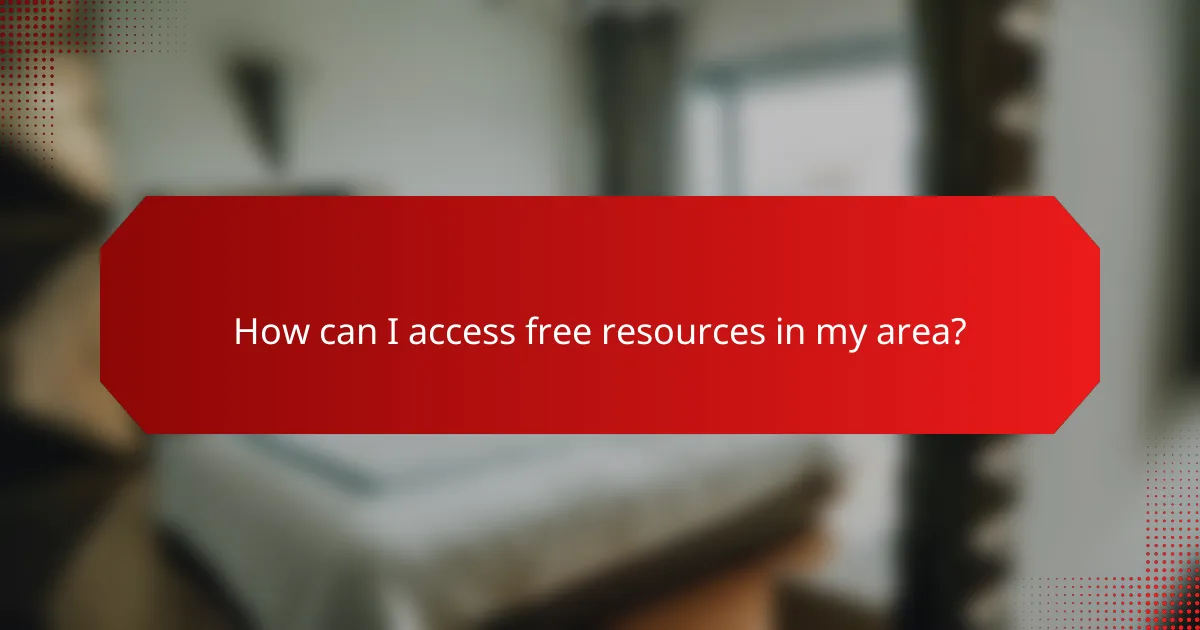
How can I access free resources in my area?
You can access free resources in your area through various platforms that connect individuals with local assistance programs. These resources often include budgeting help, food assistance, and other community services tailored to your needs.
Online resource directories
Online resource directories are comprehensive platforms that list available community services and assistance programs. Websites like 211.org allow users to search for resources by entering their zip code, making it easy to find local help.
When using online directories, ensure you check the credibility of the sources and the recency of the information provided. Many directories are updated regularly, but some may have outdated listings.
Local government websites
Local government websites are valuable sources for accessing free resources and assistance programs. These sites typically provide information on available services, eligibility requirements, and application processes.
Visit your city or county’s official website to find sections dedicated to community services. Look for links related to social services, public assistance, or community programs to discover what is available in your area.
Community centers
Community centers often serve as hubs for local resources, offering various programs and services to residents. They may provide budgeting workshops, food pantries, and referrals to other assistance programs.
To access these resources, visit your local community center or check their website for schedules and available services. Engaging with staff can also help you learn about additional resources that may not be widely advertised.
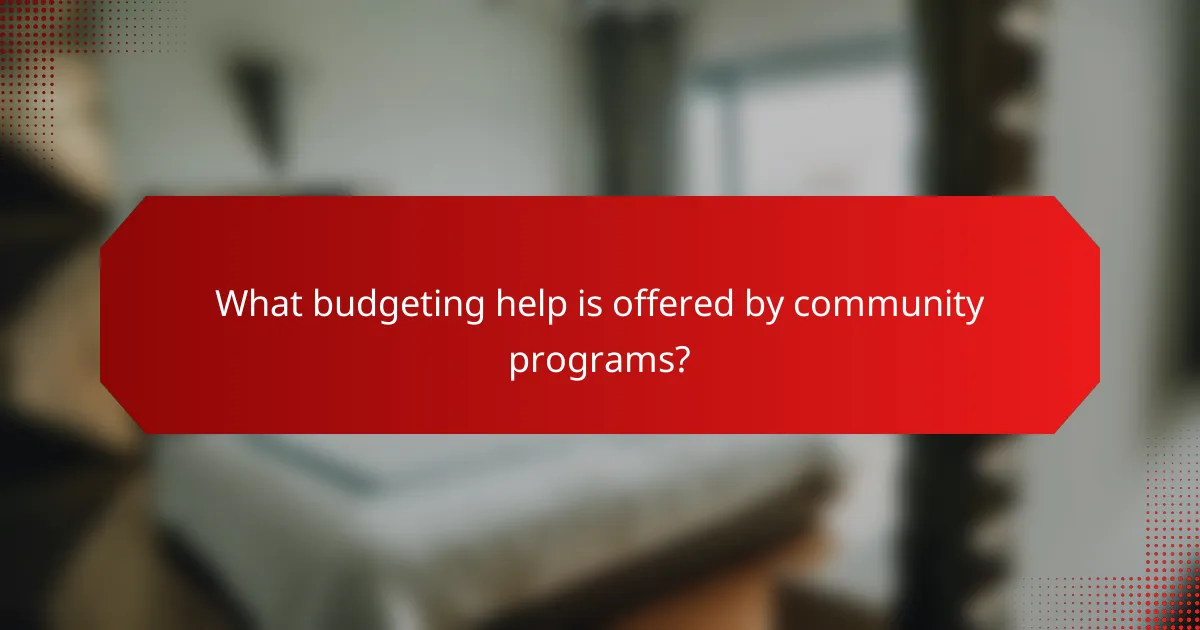
What budgeting help is offered by community programs?
Community programs provide various budgeting help options to assist individuals and families in managing their finances effectively. These resources often include workshops, personalized counseling, and debt management services designed to improve financial literacy and stability.
Financial literacy workshops
Financial literacy workshops are educational sessions aimed at teaching participants essential budgeting skills and financial concepts. These workshops typically cover topics such as saving, investing, and understanding credit scores.
Many community organizations offer these workshops for free or at a low cost, making them accessible to a wide audience. Participants can expect to learn practical strategies for managing their money, which can lead to better financial decisions.
One-on-one financial counseling
One-on-one financial counseling provides personalized guidance tailored to an individual’s specific financial situation. Counselors can help clients create budgets, set financial goals, and develop plans to achieve those goals.
This service often includes a thorough assessment of income, expenses, and debts. Clients can benefit from expert advice on how to improve their financial health and avoid common pitfalls, such as overspending or accumulating high-interest debt.
Debt management services
Debt management services assist individuals in managing and reducing their debt effectively. These services may include creating a debt repayment plan, negotiating with creditors, and consolidating debts into a single payment.
Community programs often provide these services at little or no cost, making them a valuable resource for those struggling with debt. By utilizing these services, individuals can gain control over their financial situation and work towards becoming debt-free.
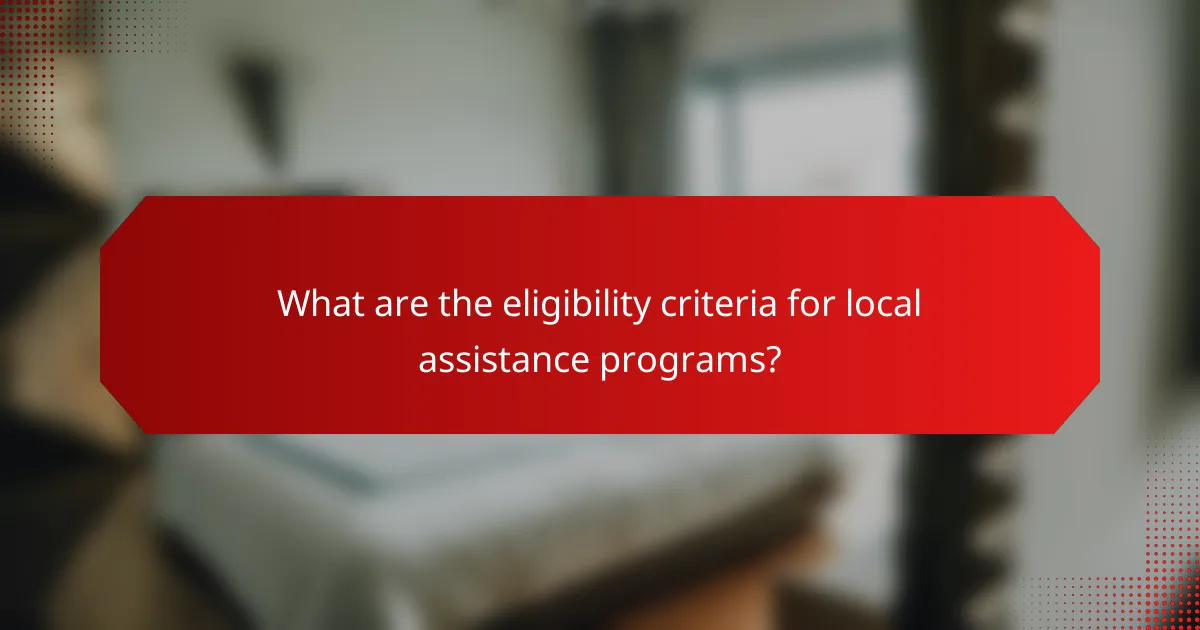
What are the eligibility criteria for local assistance programs?
Eligibility criteria for local assistance programs typically include income thresholds, residency requirements, and necessary documentation. These criteria ensure that resources are allocated to those who need them most within the community.
Income thresholds
Income thresholds determine the maximum income a household can earn to qualify for assistance. These limits vary by program and are often set as a percentage of the area median income (AMI), which can range from low to moderate income levels. For example, a common threshold might be 200% of the federal poverty level, which adjusts annually.
To assess eligibility, applicants should compare their household income against the specified thresholds for the program they are applying to. Many programs provide online calculators to help determine eligibility based on local AMI data.
Residency requirements
Residency requirements generally stipulate that applicants must live within the jurisdiction offering the assistance. This can include specific cities, counties, or states, depending on the program. Some programs may require proof of residency, such as utility bills or lease agreements.
It’s essential to verify the residency criteria for each program, as some may have additional stipulations, such as length of residency or citizenship status. Always check local guidelines to ensure compliance.
Documentation needed
Documentation is crucial for verifying eligibility for local assistance programs. Commonly required documents include proof of income, identification, and residency verification. Applicants may need to provide pay stubs, tax returns, or bank statements to demonstrate their financial situation.
Before applying, gather all necessary documents to streamline the process. Some programs may have specific forms or online submission requirements, so reviewing the application guidelines is advisable to avoid delays.
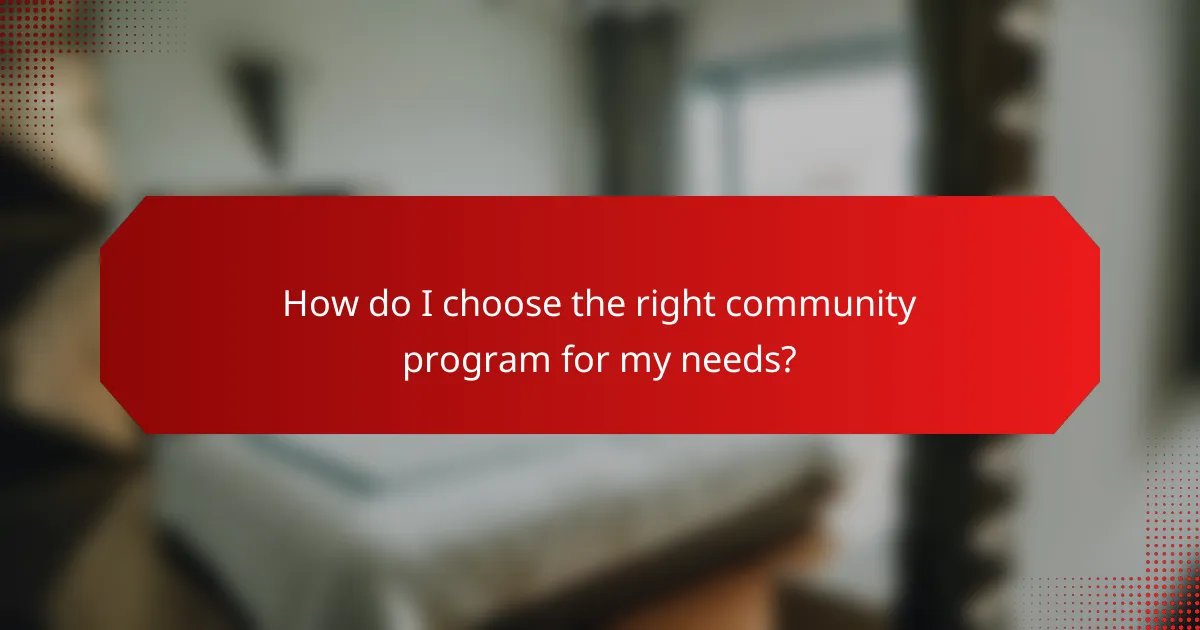
How do I choose the right community program for my needs?
Choosing the right community program involves evaluating your specific needs, understanding the benefits of available programs, and seeking advice from trusted sources. This process ensures that you select a program that effectively addresses your situation and maximizes available resources.
Assessing personal circumstances
Begin by identifying your unique situation, including your financial status, family size, and specific challenges. For instance, if you are a single parent struggling with childcare costs, look for programs that offer assistance in that area.
Consider your eligibility for various programs, as some may have income limits or require documentation. Take time to gather necessary information, such as pay stubs or tax returns, to streamline the application process.
Comparing program benefits
Once you have a list of potential programs, compare their benefits to find the best fit. Look for assistance that aligns with your needs, such as food support, housing aid, or budgeting help.
Create a simple comparison chart to evaluate key features like eligibility requirements, application processes, and the types of assistance provided. This can help you quickly identify which programs are most beneficial for your circumstances.
Seeking recommendations
Reach out to community organizations, local government offices, or social services for recommendations on effective programs. They can provide insights into which programs have helped others in similar situations.
Additionally, consider asking friends, family, or online community groups for their experiences with specific programs. Personal testimonials can guide you toward reliable resources and help you avoid potential pitfalls.
